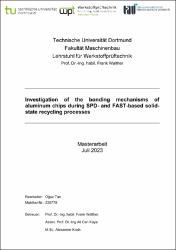Investigation of the bonding mechanisms of aluminum chips during SPD-and FAST-based solid-state recycling processes
Citation
Tan, Oğuz (2023). Investigation of the bonding mechanisms of aluminum chips during SPD-and FAST-based solid-state recycling processes. Türk-Alman Üniversitesi, Fen Bilimler Enstitüsü, İstanbul.Abstract
Considering the reduction of resources and environmental concerns, the recycling of aluminum
alloys is gaining more importance day by day. In this context, especially in light of the recycling
of aluminum chips, which constitute a significant part of aluminum scrap, the solid-state or
meltless recycling process stands out with its advantages, such as lower energy consumption,
less metal loss due to the chemical reactivity and larger surface area of metal chips, minimally
harmful gas and solid waste emissions compared to the conventional remelting method.
Solid-state recycling techniques are basically based on two main categories: severe plastic
deformation (SPD) and powder metallurgy (PM). The common purpose of both techniques in
terms of chip solid-state recycling is to improve the mechanical properties while reducing
energy requirements. The two main factors that serve this purpose are the quality of the chip
bonding and the microstructure of the resulting bulk material. However, an important obstacle
to the establishment of strong chip bonding is the oxide layers that aluminum alloys form on
their surfaces when exposed to air. In the face of bonding requirements, the hot extrusion
method, which is one of the SPD methods that provides a very high level of plastic strain to
the material with additional shear force, has become a prominent method for obtaining bulk or semi-products from aluminum chips. However, this method carries the risk of peripheral
coarse grain (PCG) zone formation due to excessive heat generation and suffers from
insufficient fragmentation of oxide layers, large thermal energy requirements, and processing
costs.
Collections
- Tez Koleksiyonu [15]

















